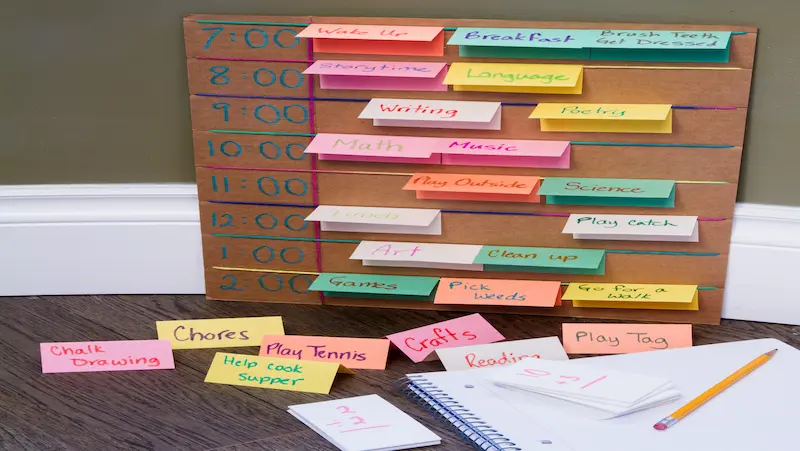The world of homeschooling can be both exciting and overwhelming, but fear not! In this brief introduction, we’ll guide you through the basics and help you understand why homeschooling might be the right choice for your child’s education.
Homeschooling for beginners, an alternative to traditional schooling, empowers parents to take charge of their children’s learning journey. Unlike the one-size-fits-all approach, homeschooling allows personalized curriculum design and individual attention. It nurtures creativity, critical thinking, and independent learning, all in the comfort of your home. In this blog, we delve into the world of homeschooling, exploring its benefits, challenges, and effective strategies to create a successful and fulfilling educational experience for children at home.
Table of contents
Understanding Homeschooling: A Brief Overview

Homeschooling, the practice of educating children at home, has been gaining popularity for its numerous advantages. Unlike traditional schooling, homeschooling allows for a more personalized learning experience, focusing on your child’s strengths, interests, and pace. It enables them to explore subjects deeply and fosters a love for lifelong learning.
Many parents choose home education, or homeschooling, to tailor their children’s learning experiences and cater to individual needs effectively. This flexible approach to education fosters a personalized and nurturing environment for academic growth.
Benefits of Homeschooling for Beginners
Homeschooling, as an alternative to traditional schooling, can offer numerous benefits for children. Here are some of the advantages of homeschooling for beginners:
1. Personalized Learning: Homeschooling enables parents to customize the curriculum according to their child’s unique learning style and speed, resulting in improved comprehension and retention of knowledge.
2. Flexibility: Homeschooling for beginners allows for flexible scheduling, ideal for families with unique circumstances or children involved in extracurricular activities.
3. Safe Learning Environment: Homeschooling offers a secure and focused learning environment, devoid of the distractions, peer pressure, and negative influences often found in traditional schools.
4. Nurturing a Love for Learning: Homeschooling nurtures a genuine love for learning by prioritizing a child’s interests and passions, encouraging them to explore subjects beyond the standard curriculum.
5. Customized Curriculum: Parents can choose and adapt educational materials and resources that align with their child’s interests and values, ensuring a well-rounded education that meets their specific needs.
6. Encouraging Independent Thinking: Homeschooling fosters children’s critical thinking and encourages them to explore and question the world without fearing peer judgement.
Getting Started with Homeschooling for beginners
Legal Requirements and Regulations
Homeschooling requirements vary depending on the state or country, but generally, parents must comply with specific regulations, such as submitting a curriculum plan, keeping attendance records, and ensuring their children receive a well-rounded education at home.
1. Notification: Parents might be required to inform the government or educational authorities of their choice to homeschool.
2. Curriculum: In certain locations, parents might need to adhere to a designated curriculum or demonstrate that they are providing an appropriate education for their children.
3. Assessments: In certain areas, there could be a requirement for regular assessments or evaluations of the child’s progress to ensure they are learning at the appropriate level.
4. Teacher Qualifications: Parents might need to meet certain educational qualifications to be recognized as homeschooling teachers.
5. Attendance Records: It may be necessary to maintain records of attendance and educational activities to show that the child is receiving a proper education.
6. Safety Checks: In a few cases, homes may be subject to safety inspections to ensure a suitable learning environment.
Choosing the Right Curriculum for Your Child

When homeschooling, selecting the right curriculum for your child is essential for their successful education. Here are some steps to help you make the best choice:
1. Understand Your Child’s Learning Style: Observe your child’s learning style (hands-on, visual, auditory) to choose a suitable curriculum.
2. Set Educational Goals: Establish educational goals for your child, including essential subjects, desired skills, and specific areas of focus.
3. Research Curriculum Options: Explore the diverse homeschooling curricula with different approaches and philosophies. Conduct research, read reviews, and take your child’s interests and strengths into account when making a decision.
4. Seek Recommendations: Seek recommendations from other homeschooling families through online forums, social media groups, and local homeschooling for beginner communities. Their experiences with different curricula can provide valuable insights.
5. Consider Your Teaching Style: Consider your teaching style and choose a curriculum that aligns well with it for a more enjoyable and effective homeschooling experience.
6. Be Flexible: Remember that homeschooling allows for flexibility. If a particular curriculum isn’t working for your child, don’t hesitate to switch to something else that better meets their needs.
7. Involve Your Child: Whenever possible, involve your child in the decision-making process. Their input and preferences can make them more enthusiastic about their homeschooling journey.
Setting Up Your Homeschooling Space
Setting up your homeschooling space is crucial for creating a conducive learning environment for your child. Start by selecting a quiet and dedicated area in your home, free from distractions and noise. It could be a corner in the living room, a spare room, or even a section of your child’s bedroom. Ensure the space is well-lit with natural light and equipped with all the necessary learning materials, such as a sturdy desk, comfortable chair, and age-appropriate educational resources.
Organize shelves or storage units to keep books, stationery, and other supplies within easy reach. Personalize the space with motivational posters or artwork to inspire your child’s learning journey. Remember that a well-organized and inviting homeschooling space can positively impact your child’s focus and enthusiasm for learning, setting the stage for a successful homeschooling experience.
Creating a Homeschooling Schedule

Creating a well-structured homeschool schedule is crucial for establishing a consistent routine that balances academic lessons, breaks, and other activities, providing students with an organized and effective learning environment.
The schedule can be flexible, and breaks can be adjusted as needed. Allow time for your child to explore their interests and provide opportunities for self-directed learning. It’s essential to maintain a balance between structured learning and unstructured playtime to keep your child engaged and motivated. Adapt the schedule as you go based on your child’s progress and feedback. Remember, homeschooling for beginners allows for personalized learning, so feel free to modify the schedule to best suit your child’s needs.
Curriculum planning is also a crucial aspect of homeschooling, as it involves selecting appropriate learning materials, resources, and subjects to cover, while a well-structured homeschooling schedule helps create a consistent and organized routine for daily lessons and activities.
Balancing Academic and Non-Academic Activities
In homeschooling, striking a balance between academic and non-academic activities is crucial for a well-rounded and enriching educational experience for kids. While focusing on core subjects like mathematics, science, and language arts is essential for their intellectual growth, incorporating non-academic activities is equally vital to nurture their creativity, social skills, and physical development. Engaging in arts and crafts, sports, music, or community service projects not only fosters a sense of joy and accomplishment but also encourages critical thinking and problem-solving abilities outside the traditional classroom setting.
Assessing Progress and Success
To effectively assess a child’s progress, homeschooling parents can employ various assessment methods that are tailored to the child’s individual learning style and needs. These methods can include subject-specific quizzes, standardized tests, and project-based assessments, among others. By using diverse assessment tools, parents can gain a comprehensive understanding of their child’s academic strengths and areas where improvement is needed.
The beauty of homeschooling lies in its flexibility, which enables parents to adjust the curriculum and teaching methods based on the child’s progress and interests.
Homeschooling and Parenting

Homeschooling and parenting are deeply interconnected, as homeschooling involves parents taking on the role of educators to guide their child’s learning journey. The decision to homeschool often arises from a desire to provide a more personalized and tailored education that aligns with the child’s unique strengths, interests, and learning style. This endeavor places a significant responsibility on parents, impacting various aspects of their parenting approach.
Parent involvement in schools and homeschooling plays a significant role in shaping a child’s education. In traditional schools, parent engagement can positively impact a student’s academic performance, behavior, and overall well-being, whereas in homeschooling, parents are directly responsible for designing and delivering their child’s education, fostering a close and personalized learning experience. Home schooling parents often seek a comprehensive homeschool science curriculum that engages their children in hands-on experiments and exploration, fostering a love for learning about the natural world from the comfort of home.
Here are some key aspects of the relationship between homeschooling and parenting:
1. Educational Facilitators: Homeschooling parents take on the role of primary facilitators, responsible for selecting curriculum, designing lessons, and organizing educational activities to meet their child’s academic needs.
2. Parental Growth: Homeschooling challenges parents to continually grow and learn alongside their child, expanding their knowledge and teaching abilities.
3. Lifelong Learning: Homeschooling parents model the value of lifelong learning, showing their child that education extends beyond formal schooling and is a lifelong pursuit.
Conclusion
In conclusion, homeschooling can be a rewarding and effective educational option for beginners, providing a personalized and flexible approach to learning. While it may seem daunting at first, with careful planning, dedication, and access to various educational resources, parents can create a nurturing and stimulating environment for their children’s growth and development. Homeschooling allows for individualized attention, tailored curriculum, and the incorporation of real-world experiences, fostering a deep understanding and love for learning. It also grants the flexibility to explore interests, values, and unique learning styles, ensuring children reach their full potential. Online schooling and homeschooling offer flexible and innovative approaches to education, allowing students to learn from home or virtually.
Join the revolution in education with Brightchamps. Our courses in robotics, coding, and financial literacy empower kids to become confident and capable learners.
Navigating the complex landscape of education and child development can be daunting, but with the BrightChamps blog page at your fingertips, you’ll find clarity and confidence in your journey. Unveil articles that delve into the latest advancements in pedagogy, providing actionable strategies to enhance learning experiences for children of all ages.
Frequently Asked Questions (FAQs)
A. The legal requirements for homeschooling differ based on your country or state. Research and understand the specific regulations in your location. Common requirements may include submitting an educational plan, maintaining attendance records, and participating in periodic assessments.
A. Absolutely! In many places, being a certified teacher is not a mandatory prerequisite for homeschooling your child. Parents or guardians are usually allowed to homeschool, regardless of their teaching credentials.
A. Selecting the right curriculum is crucial to your child’s homeschooling journey. Consider the following factors like: Learning Style, Interests, Flexibility etc.
A. While homeschooling can be a rewarding experience, it comes with its challenges. Some common hurdles include Time Management, Motivation, Assessment.
A. Some alternatives to traditional homeschooling include Montessori education, charter schools with homeschooling programs, and online schools offering structured curricula and teacher support.


 We are an army of educators and passionate learners from BrightChamps family, committed to providing free learning resources to kids, parents & students.
We are an army of educators and passionate learners from BrightChamps family, committed to providing free learning resources to kids, parents & students.







